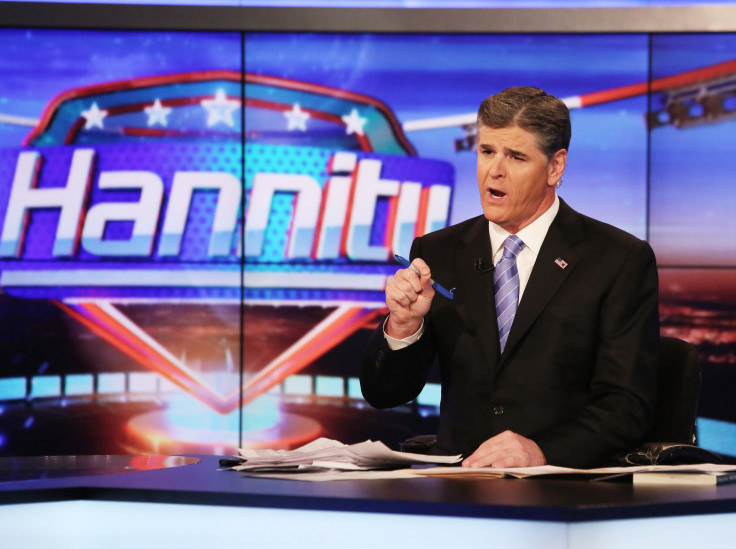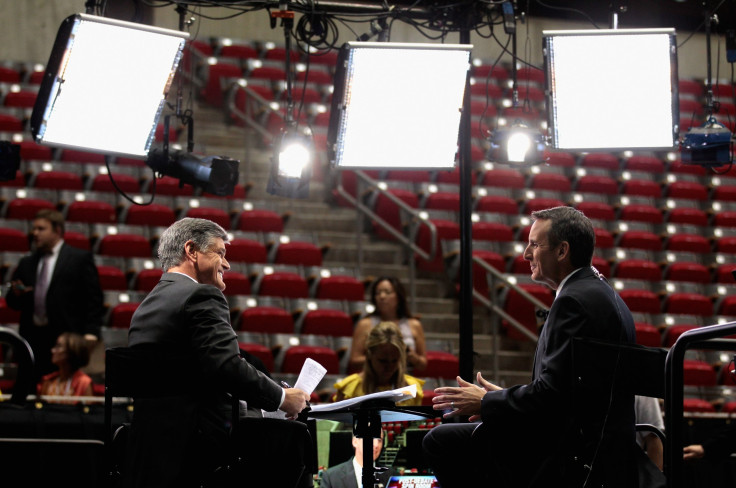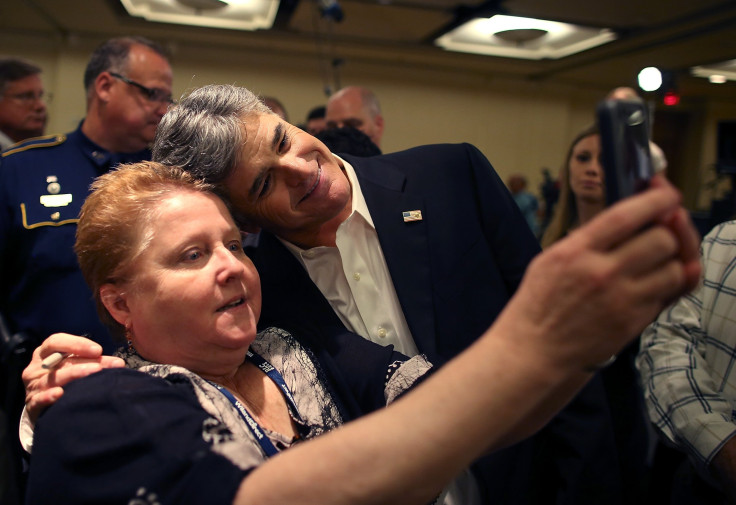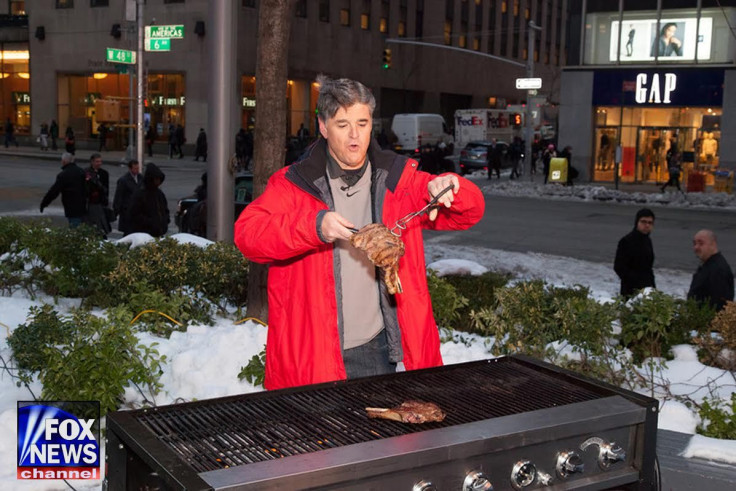Mr. Nice Guy: Sean Hannity, Cheerleader For The GOP — And A Relic At Fox News?

Sean Hannity warned me repeatedly that his lunch order would be a weird one. Graying but still boyish with a toothy grin, the Fox News personality sat on the second floor of Del Frisco’s steakhouse across the street from his office at News Corp. in midtown Manhattan. The “weird” lunch turned out to be scrambled eggs with onions and a dash of bacon. Usually, Hannity explained, he would order a thick steak.
“I’m just on a really strict regimen right now, because I’m working out so much,” he said. The conversation rapidly moved to his workout routine, specifically his passion for mixed martial arts. “I hit the heavy bag, I hit the mitts, I do a lot of core.”
It was as good a place to start as any. After all, in a recent episode of “Hannity,” his prime-time Fox show, the host mocked President Barack Obama’s workout routine and rolled footage of himself training with retired UFC champion Chuck Liddell. Hannity, baseball cap plastered to his head, pummeled Liddell’s gloves as the two sparred in a customized gym built into Hannity’s home. “Yeah, he wasn’t really good at holding the mitts,” Hannity said. “I usually do it with my guy. My guy, he’s really good at holding them, but I’m punching so hard he doesn’t want to do it anymore.”
Hannity turned to a waitress as she filled up his glass of water. “We’re talking about my MMA workout.” She nodded. “He’s interviewing me. He’s part of the liberal media, so be careful,” he added.
“How’s that going for you?” the waitress asked him.
It’s been going pretty well since 1996, when Hannity was handpicked by Roger Ailes as part of the original team at Fox that more or less redefined cable news. In an industry dominated by CNN, Fox torpedoed the unspoken standard that news should be impartial and tapped into an audience incredibly thirsty for conservative commentary. Under his boss’s tutelage, Hannity became a sensation, making viewers at home squeal with glee as he filleted his squishy co-host Alan Colmes, Fox’s house liberal, until he went solo in 2008.
Hannity stood out, even at Fox, as the GOP’s man inside the network, unloading on Democrats and liberals while cultivating his access within the Republican Party. Unlike Bill O’Reilly, who gleefully strays from party positions -- he says he supports action against climate change and opposes the death penalty, for example -- Hannity is reliably loyal to the GOP. He’s mastered the bravado of the right-wing shock jock, whether he’s comparing the Black Lives Matter campaign to the Ku Klux Klan, or telling a female guest to “follow the bouncing ball” while he explains terrorism to her.
But in 2013, the middle of the Obama years and a time of peak rabble-rousing for conservative pundits, Hannity was bumped down from 9 p.m. to 10 p.m. Megyn Kelly, a breakout hit at the network, took over his old slot, while O’Reilly retained his throne at 8 p.m. Fox may be enjoying an election-season boom in viewers right now, but Hannity has fallen off in recent years. These days, more than 2 million viewers tune in to Kelly at 9 p.m., the kind of numbers Hannity used to get. After she wraps up, half a million switch off, and Hannity is left with 1.5 million.
Adding insult to injury, this is a crowded Republican primary season seemingly tailor-made for Hannity — yet so far it’s been Kelly in the spotlight. She’s earned monster ratings and critical praise from both liberals and conservatives for her stint as debate moderator this summer, not to mention for holding her own against the bizarre attacks of GOP front-runner Donald Trump.
Hannity paused before addressing Kelly’s takeover of his slot. “Best thing that ever happened to me,” he said. Asked whether he felt he was being eclipsed by a rising star, he simply replied, “she’s a huge star.”
“It was the best thing that ever happened,” he repeated. “Look, I have two kids. I was live every single, solitary night for what, 18, 17 years, whatever it was. I was lucky because I was able to get some more flexibility with my schedule.” Since his schedule shift, he said, Fox has built him a studio close to his home in Long Island to use at his leisure.
O’Reilly, meanwhile, got months of free publicity this year for an ostensibly damaging story about his fabrication of tall tales throughout his journalistic career. His viewers didn’t care; ratings actually increased as O’Reilly once again triumphed over the "liberal" press and continued dominating the Nielsen charts.
Where does this leave Hannity? Still a key name at Fox, no doubt, but a diminished figure.
‘Hannity’s a Hoot’
“The country is going down the sh-tter,” Hannity said, his voice rising while his plate of eggs went cold. What followed was a monologue seemingly pieced together from bits of his radio and TV shows. “Reagan said, is it a third party we need? No, it’s a revitalized second party with no pale pastels but bold differences.”
When you get him talking — which is, after all, his job — Hannity speaks with a passion, earnestness and grandeur that sets him apart from most of his fellow Fox originals: He was never as goofy as morning show fop Steve Doocy, nor was he as manic as O’Reilly, the network’s culture warrior. Boss man and master talent scout Ailes plucked the rising right-wing broadcaster out of Atlanta in 1996 and dropped him into New York, where Hannity continued his radio ascent by following up industry titan Rush Limbaugh on WABC.

It took him a bit to transition to television. “I was awful,” Hannity, a Long Island native, said of his first few months on Fox. “I couldn’t do TV, I was a radio guy. I asked Roger why didn’t he fire me. He said, ‘I knew you’d get it.’”
Bill Shine, Fox’s senior executive VP, remembers Hannity from those days. They met in the summer of 1995, at a station that’s no longer around. “He was a substitute host; we flew him up to New York from Atlanta,” Shine said. “The girls in the office all thought he was cute.”
When Hannity got the Fox gig the next year, he hooked up Shine, a fellow Long Islander, with a job as the first senior producer of “Hannity and Colmes.” “Back then Fox was only in 17 million homes and nobody knew who Sean was at all,” Shine said. “We tried to book members of Congress and they’d be like, ‘you’re not even on-air in my district.’”
“I asked Roger why didn’t he fire me. He said, ‘I knew you’d get it.’”
Now Hannity is a household name, and an apparent favorite among Fox employees. A makeup artist spent at least two minutes explaining how Hannity is the nicest man in show business. (“I swear that wasn’t a plant,” a Fox PR person said.) “Yeah, Hannity’s a hoot,” said Lou, one of his cameramen, during a taping of the show. “One time he challenged me to do a hundred pushups.” The worker turned to Hannity, who was wiring up his mic to do a segment, his blue jeans visible underneath his desk. “How many was it? A hundred?”
The mere mention of this incident brought Hannity to the middle of the set, where he challenged the crewman to a brief rematch. They both dropped to the floor and started pumping out pushups. Hannity grunted and eventually started clapping his hands in between pushups, Travis Bickle-style .
Janet Fallon, a PR consultant, event planner and onetime organizer for Pat Buchanan, has kept in touch with Hannity since meeting him through radio promos back in 1994. She described him as loyal above all else. “And, you know, he has a lot of Democrat friends!”
At lunch, Hannity confirmed that he’s able to put aside his politics during commercial breaks. “Yeah, of course. I was friends with Alan Colmes. I’m friends with Geraldo [Rivera]. Tamara Holder [a liberal Fox contributor] is a friend of mine. I think they’re wrong, and when we’re debating, we’re debating.”
But how civil can things be when that disagreement is about whether or not America is turning into a socialist dictatorship?
“Well, now, that’s real,” he cut in. One soliloquy later: “America, we have lost any touch with the concept of limited government, greater liberty, greater freedom” — he had locked himself into the Spider-Man quote — “and with liberty and freedom comes greater responsibility.”
Mr. Nice Guy
During the George W. Bush years, Hannity acted as a staunch defender of the administration and Republicans in power. But ever since 2009, when Obama entered the White House and the Tea Party movement tapped into popular resentment with the Republican establishment, Hannity has styled himself a mad-as-hell right-wing dissident.
“There’s a Washington Post poll. I often cite it on my show: Sixty percent of Republicans feel betrayed by Washington Republicans,” he said. “And I think for good reason. These [Republicans in Congress] ran in 2010 on the promise that they would repeal Obamacare, and they didn't get it done. ... Now conservatives like myself are frustrated that they won’t even defund Planned Parenthood.”
(IBT later contacted Fox for a link to that poll, which Hannity does often bring up on his TV and radio shows, citing the Washington Post. It turned out to be an in-house Fox News poll .)

Flashing his own badge of independence, Hannity said he doesn’t register to vote as a Republican. “In New York you can register as a Conservative. They also have the Liberal Party in New York.”
Yet for all his populism, Hannity doesn’t use his influence to make a scratch on the GOP. Conservative political consultant Matt Mackowiak, while praising Hannity as an influential broadcaster, has noticed the host’s lack of initiative. “He complains about leadership a lot. He parrots the conservative base, but he doesn’t have a real issue he focuses on. You don’t see him using his influence for a policy outcome.”
Of course, that’s not how Hannity sees it. “I want to be one of the spokes in the wheels pushing the ideas that will help save the country,” he said. “Do I think I could do it myself? Absolutely not. If I could do it myself Obama never would have been president, ‘cause I pushed hard. Really hard.” Asked to explain what he meant, Hannity said he was one of the first in the media who zeroed onto the Rev. Jeremiah Wright, Obama’s bombastic pastor in Chicago who caused him a major headache in the middle of the 2008 campaign for his sermons damning America as a fallen nation.
“If I could do it myself Obama never would have been president, ‘cause I pushed hard. Really hard.”
But the Jeremiah Wright days were simpler times. Now, conservatives believe the greatest enemy is within the party itself. But like Bush, Hannity wants to be a uniter, not a divider. For a while he criticized then-House Speaker John Boehner as a wimp, but beyond that low-hanging fruit he doesn’t tend to name names.
When asked to place himself on a spectrum of conservatism to get a better idea of where he stood, Hannity bristled. “I don’t, I don’t — you know, that’s a narrative that the Left advances.” Okay. What positions does he disagree with among the presidential candidates? No dice. What could one of them do to lose the Hannity vote? “Nice trick.”
A picture begins to emerge of a conservative who wants to be loved rather than feared. Over the course of one lunch, he managed to say something positive about nearly every single candidate running. Florida Sen. Marco Rubio “will be president some day.” Sen. Ted Cruz completely schooled the media during the raucous CNBC debate. Govs. John Kasich, Bobby Jindal and Scott Walker have all done “an outstanding job.” Jeb Bush, who has plummeted from double to single digits in the polls, is merely “underperforming.” Rick Perry had “a great record” and was unfairly laughed out of politics for one silly debate flub.
And don’t get him started on his good friend Donald Trump, whose brand of ties he flashed later while taping his show. When a feud between Trump and Fox News erupted this summer, the front-runner went on Hannity’s show to make peace in a fawning interview; Hannity even let the mogul slip in a subtle dig at Kelly’s “unfair” treatment of him during the first debate. He later said he provided counsel to Trump during the spat.
At times Hannity is a literal cheerleader: At this year’s Conservative Political Action Conference, he hyped the crowd, jogged around the stage and threw plush footballs into the audience.

In stark contrast, last year his fellow radio star and Fox personality Laura Ingraham waged a successful media campaign to oust then-House Majority Leader Eric Cantor from power. O’Reilly made an unrelenting and public case for “Kate’s Law,” writing an open letter to Boehner and Senate Majority Leader Mitch McConnell pitching the draconian immigration bill. Matt Drudge regularly sets the right-wing internet on fire by stoking rumors about party grandees and accusing GOPers in Congress of “treason.” RedState founder and CNN contributor Erick Erickson tars and feathers the leadership on the regular (“Eunuch Mitch McConnell Squeals Like a Pig”) and openly lobbies for anti-gay laws in Georgia.
That’s the kind of blood sport Tea Partiers want, but Hannity, footballs and all, hasn’t done anything of the kind.
Hannityland
What Hannity lacks in radical cred, he makes up for in personal branding. Take his "Hannitization" live radio tours, his website’s catalogue of his various neckties -- “HanniTies” -- or his dating website for right-wingers: the defunct “Hannidate.”
“Many people got married,” he said confidently of the site. “I don’t know the whole number, but a lot. It went for a while, but I had to stop it because it became a legal issue.” What kind of legal issue? He sighed. “This person marries this person, now the lawyers are worried about what happens if that marriage doesn’t work out. 'They met on your website, so you’re responsible.' And I’m like, this is ridiculous. It bothered me.”
“Hannidate: The place where people of like conservative minds can come together to meet,” the site's banner read back in 2006. “It's fun, interactive, safe and anonymous -- until you decide to take it further,” read the description.
Does he have any plans to bring back “Hannidate” in the era of Tinder? “I actually love the idea,” he said.
Hannity confided that sometimes, when he’s traveling the country or bored during book signings, he will put “cute couples” on the spot and pressure the man into proposing to his girlfriend. He said Ted Cruz once watched him do it. “I’m like, ‘how long you been dating?’ ... ‘Okay, why haven’t you asked her?’ And I put him under the gun. Then I say, ‘why don’t you do it now?”
Hannity began to gesture to an imaginary crowd. “Don’t you think he should do it now?’ And the crowd gets into it,” he said breathlessly. “I have a success rate of about 90 percent.”
How does he know that they’ve gone on and gotten married? He paused. “I don’t, but it doesn’t matter.”
A Paper Tiger?
Hannity did recently make a mark on politics -- by accident. Pursuing a bid for the speakership when Boehner resigned, House Majority Leader Kevin McCarthy appeared on the show in October and, with the casualness of a friend hanging out in another’s basement, told Hannity that the special House committee to investigate the 2012 Benghazi attacks was a great way for Republicans to chip away at Democratic candidate Hillary Clinton.
It was an example of Fox’s chummy atmosphere working against, rather than for, a Republican politician. McCarthy’s remarks, instant PR ammunition to the Clinton camp, embarrassed the majority leader into withdrawing his speaker bid as his fellow Republicans berated him for his “gaffe.”
It’s safe to say Hannity wasn’t gunning for that outcome. "The way I took it is that he misspoke," Hannity said at the time. "It became a bigger deal than I thought it would.”

So as his peers go after the GOP congressional leadership and lobby for pet legislation, Hannity seems comfortable just doing his show. He’s been vocal about his support for “the penny plan” to reduce the national debt, and posted a wish list for a fictional “Conservative Solutions Caucus” on his website. But he didn’t describe any strategy or plan to make those things happen.
“He does not want every member of Congress to be defeated in a primary, he’s not a full-blown Tea Partier,” Mackowiak said. “He wants to be able to get the guests he wants, when he wants them. He wants to have exclusives.” Another operative, who asked not to be named lest he be caught endorsing a media figure, had a more flattering take that made the same point: “Hannity continually delivers big interviews of key players in national politics and is an absolute must-follow voice on both TV and radio as we head into the 2016 election.”
Responding to a follow-up question weeks later, Hannity brushed off the idea that he backs down from putting pressure on the powerful. “My role is not to tell my audience who to vote for. I give my audience access to the candidates they are considering and respect them enough to let them make their own decision.”
“I am a conservative, but I consider myself a talk show host. If you ask me, am I a journalist? No."
And there lies the apparent purpose of Hannity in 2015. As the Republican Party continues to crack, under assault by hardliners who think Ayn Rand-devotee Paul Ryan isn't libertarian enough, Fox's friend to the GOP pays lip service to the right while schmoozing with the “Washington Republicans” he derides. “Hannity is where Republicans go to talk about politics,” Mackowiak said. “If you’re a Republican and you wanna talk to the conservative base, you go on his show.”
At one point during lunch, Hannity seemed to candidly confirm the priority of show business over achieving change.
“I am a conservative, but I consider myself a talk show host. If you ask me, am I a journalist? No. Advocacy journalist, you could say that, but I consider myself a talk show host. And I wear many hats. Sometimes I do straight interviews. Sometimes I do debate. Sometimes I just give monologues on radio that go on for an hour. Y’know, it’s all-encompassing under that banner, meaning a talk show host.”
Push The Button
As Megyn Kelly and Fox News at large win praise this election season for challenging candidates with pointed, tougher questions, Hannity’s value is more particular, as liaison to the GOP.
He seems to represent a different epoch of the Fox News Channel: a turbocharged talking head rather than the image of an independent journalist. Roger Ailes is up in years and the young, more liberal Murdoch sons are slowly but surely taking over responsibility for their father Rupert’s properties at News Corp. and 21st Century Fox. Hannity’s 20-year mark feels like the sunset of the Ailes era, as something familiar but different takes shape.
Asked what he would do if and when he parts ways with Fox: “Probably drive around in the car, talk to myself for three hours a day.”
When the question came up again, he looked annoyed. “I’m 53, I’m young, I’m healthy, I’m not thinking about anything in the future. You wanna know what I care about now more than anything? It’s my country being saved so my kids and grandkids have a better place. And right now we’re screwing it up as bad as you can screw this thing up. And so I’m more passionate about fixing it than I am about getting out of the game and not playing.”
That day, he interviewed over satellite Trump and Rubio (just “Marco,” when the cameras were off). Later, he did a segment with his “friend” and attorney for two decades, David Limbaugh, promoting his "spectacular" book on Christianity. Yes, another pal, and, yes, Rush Limbaugh’s brother.
During his closing monologue , Hannity repeated, almost word for word, the answers he gave during lunch. The “Washington Post” poll. The Reagan quote about “bold colors.” The call for new conservative solutions. Much like a politician himself, he’s delivered these same bromides so many times he can access them as soon as someone pushes the button.
Seconds before the show began, as the opening graphics swirled inside the TV monitors, Hannity squinted at me through all the lights and machinery and whispered: “What if I’ve got nothing to say?”
© Copyright IBTimes 2024. All rights reserved.






















